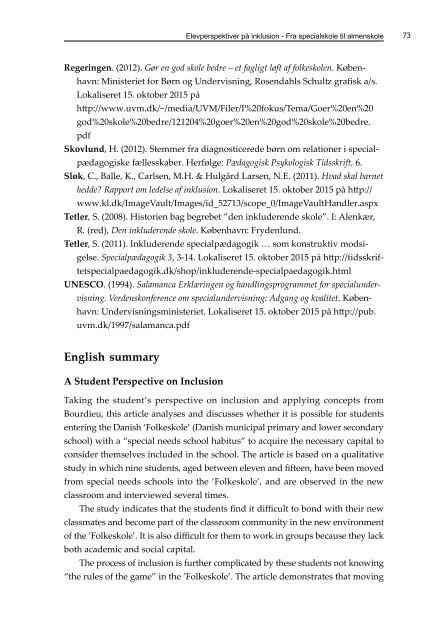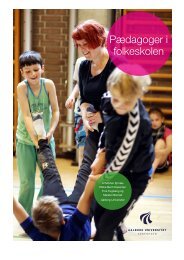- Page 1 and 2:
CURSIV Nr. 17 2015 1 Perspektiver
- Page 3 and 4:
2 CURSIV CURSIV udgives af DPU, Aar
- Page 5 and 6:
4 Indespærring eller frigørelse -
- Page 7 and 8:
6 Karen Bjerg Petersen Lynggaard &
- Page 9 and 10:
8 Karen Bjerg Petersen Artiklen ”
- Page 11 and 12:
10 Karen Bjerg Petersen rummelighed
- Page 13 and 14:
12 Karen Bjerg Petersen Laura Mørk
- Page 15 and 16:
14 Karen Bjerg Petersen English sum
- Page 17 and 18:
16
- Page 19 and 20:
18 Susan Tetler Landsforening, Unde
- Page 21 and 22:
20 Susan Tetler udviklede sig stadi
- Page 23 and 24: 22 Susan Tetler elevgrupper, men tv
- Page 25 and 26: 24 Susan Tetler primært et holdnin
- Page 27 and 28: 26 Susan Tetler Farrell, P. (2004).
- Page 29 and 30: 28 Susan Tetler Studies show that e
- Page 31 and 32: 30 Berit H. Johnsen inkludering og
- Page 33 and 34: 32 Berit H. Johnsen i undervisninge
- Page 35 and 36: 34 Berit H. Johnsen • Økende seg
- Page 37 and 38: 36 Berit H. Johnsen Offentlige inte
- Page 39 and 40: 38 Berit H. Johnsen • Kjønn, alt
- Page 41 and 42: 40 Berit H. Johnsen Det (inkluderin
- Page 43 and 44: 42 Berit H. Johnsen Relasjonspedago
- Page 45 and 46: 44 Berit H. Johnsen ”alle”. Hun
- Page 47 and 48: 46 Berit H. Johnsen s. 341, egen ov
- Page 49 and 50: 48 Berit H. Johnsen Johnsen, B.H. (
- Page 51 and 52: 50 Berit H. Johnsen Tetler, S. (200
- Page 53 and 54: 52
- Page 55 and 56: 54 Line M. Laursen & Karen Bjerg Pe
- Page 57 and 58: 56 Line M. Laursen & Karen Bjerg Pe
- Page 59 and 60: 58 Line M. Laursen & Karen Bjerg Pe
- Page 61 and 62: 60 Line M. Laursen & Karen Bjerg Pe
- Page 63 and 64: 62 Line M. Laursen & Karen Bjerg Pe
- Page 65 and 66: 64 Line M. Laursen & Karen Bjerg Pe
- Page 67 and 68: 66 Line M. Laursen & Karen Bjerg Pe
- Page 69 and 70: 68 Line M. Laursen & Karen Bjerg Pe
- Page 71 and 72: 70 Line M. Laursen & Karen Bjerg Pe
- Page 73: 72 Line M. Laursen & Karen Bjerg Pe
- Page 77 and 78: 76
- Page 79 and 80: 78 Thomas Hylland Eriksen tatt ha b
- Page 81 and 82: 80 Thomas Hylland Eriksen paradoksa
- Page 83 and 84: 82 Thomas Hylland Eriksen hver morg
- Page 85 and 86: 84 Thomas Hylland Eriksen ‘Draban
- Page 87 and 88: 86 Thomas Hylland Eriksen Løvlia o
- Page 89 and 90: 88 Thomas Hylland Eriksen lettelse
- Page 91 and 92: 90 Thomas Hylland Eriksen Som jeg h
- Page 93 and 94: 92 Thomas Hylland Eriksen Eriksen,
- Page 95 and 96: 94
- Page 97 and 98: 96 Ivar Morken slik at den blir ove
- Page 99 and 100: 98 Ivar Morken vanligere å kategor
- Page 101 and 102: 100 Ivar Morken psykologens diagnos
- Page 103 and 104: 102 Ivar Morken til Skjeie stiller
- Page 105 and 106: 104 Ivar Morken omtales som elever
- Page 107 and 108: 106 Ivar Morken er at det flerkultu
- Page 109 and 110: 108 Ivar Morken Jeg leser Globograf
- Page 111 and 112: 110 Ivar Morken gruppetilhørighet,
- Page 113 and 114: 112 Ivar Morken Eriksen, T.H. (1994
- Page 115 and 116: 114
- Page 117 and 118: 116 Claus Haas anderledes, hvis man
- Page 119 and 120: 118 Claus Haas Men inklusion af min
- Page 121 and 122: 120 Claus Haas National afvikling o
- Page 123 and 124: 122 Claus Haas (Undervisningsminist
- Page 125 and 126:
124 Claus Haas erindringspolitiske
- Page 127 and 128:
126 Claus Haas I en historiedidakti
- Page 129 and 130:
128 Claus Haas der vedrører en fai
- Page 131 and 132:
130 Claus Haas mod multikulturalism
- Page 133 and 134:
132 Claus Haas Haas, C. (2011b). De
- Page 135 and 136:
134 Claus Haas English summary The
- Page 137 and 138:
136 Ulf Dalvad Berthelsen & Karen B
- Page 139 and 140:
138 Ulf Dalvad Berthelsen & Karen B
- Page 141 and 142:
140 Ulf Dalvad Berthelsen & Karen B
- Page 143 and 144:
142 Ulf Dalvad Berthelsen & Karen B
- Page 145 and 146:
144 Ulf Dalvad Berthelsen & Karen B
- Page 147 and 148:
146 Ulf Dalvad Berthelsen & Karen B
- Page 149 and 150:
148 Ulf Dalvad Berthelsen & Karen B
- Page 151 and 152:
150 Ulf Dalvad Berthelsen & Karen B
- Page 153 and 154:
152 Ulf Dalvad Berthelsen & Karen B
- Page 155 and 156:
154 Ulf Dalvad Berthelsen & Karen B
- Page 157 and 158:
156 Ulf Dalvad Berthelsen & Karen B
- Page 159 and 160:
158
- Page 161 and 162:
160 Jørn Bjerre Problemer i det p
- Page 163 and 164:
162 Jørn Bjerre inklusion, men int
- Page 165 and 166:
164 Jørn Bjerre At den politiske b
- Page 167 and 168:
166 Jørn Bjerre Rummeligheden komm
- Page 169 and 170:
168 Jørn Bjerre På denne måde ko
- Page 171 and 172:
170 Jørn Bjerre En social-psykolog
- Page 173 and 174:
172 Jørn Bjerre • Inklusion i de
- Page 175 and 176:
174 Jørn Bjerre Referencer Alenkæ
- Page 177 and 178:
176 Jørn Bjerre Silver H., (1994).
- Page 179 and 180:
178 Morten Timmermann Korsgaard for
- Page 181 and 182:
180 Morten Timmermann Korsgaard Den
- Page 183 and 184:
182 Morten Timmermann Korsgaard I d
- Page 185 and 186:
184 Morten Timmermann Korsgaard I d
- Page 187 and 188:
186 Morten Timmermann Korsgaard Ink
- Page 189 and 190:
188 Morten Timmermann Korsgaard 2 A
- Page 191 and 192:
190
- Page 193 and 194:
192 Anders Kruse Ljungdalh af forsk
- Page 195 and 196:
194 Anders Kruse Ljungdalh i divers
- Page 197 and 198:
196 Anders Kruse Ljungdalh deltagel
- Page 199 and 200:
198 Anders Kruse Ljungdalh Funktion
- Page 201 and 202:
200 Anders Kruse Ljungdalh Uddannel
- Page 203 and 204:
202 Anders Kruse Ljungdalh Socialpo
- Page 205 and 206:
204 Anders Kruse Ljungdalh en bestr
- Page 207 and 208:
206 Anders Kruse Ljungdalh I rappor
- Page 209 and 210:
208 Anders Kruse Ljungdalh småbør
- Page 211 and 212:
210 Anders Kruse Ljungdalh mellem b
- Page 213 and 214:
212 Anders Kruse Ljungdalh Holt, N.
- Page 215 and 216:
214 Anders Kruse Ljungdalh Undervis
- Page 217 and 218:
216
- Page 219 and 220:
218
- Page 221 and 222:
220 Frans Ørsted Andersen Indledni
- Page 223 and 224:
222 Frans Ørsted Andersen en kvant
- Page 225 and 226:
224 Frans Ørsted Andersen • Kara
- Page 227 and 228:
226 Frans Ørsted Andersen store sl
- Page 229 and 230:
228 Frans Ørsted Andersen Learning
- Page 231 and 232:
230 Frans Ørsted Andersen karakter
- Page 233 and 234:
232 Frans Ørsted Andersen over til
- Page 235 and 236:
234 Frans Ørsted Andersen og perso
- Page 237 and 238:
236 Frans Ørsted Andersen intervie
- Page 239 and 240:
238 Frans Ørsted Andersen På bagg
- Page 241 and 242:
240 Frans Ørsted Andersen Hattie,
- Page 243 and 244:
242 Karen Bjerg Petersen Introdukti
- Page 245 and 246:
244 Karen Bjerg Petersen 2004) - at
- Page 247 and 248:
246 Karen Bjerg Petersen Som følge
- Page 249 and 250:
248 Karen Bjerg Petersen I projektb
- Page 251 and 252:
250 Karen Bjerg Petersen 7. Interku
- Page 253 and 254:
252 Karen Bjerg Petersen I forlæng
- Page 255 and 256:
254 Karen Bjerg Petersen Desuden se
- Page 257 and 258:
256 Karen Bjerg Petersen Kategorien
- Page 259 and 260:
258 Karen Bjerg Petersen Ifølge Ch
- Page 261 and 262:
260 Karen Bjerg Petersen De unge ha
- Page 263 and 264:
262 Karen Bjerg Petersen projektet,
- Page 265 and 266:
264 Karen Bjerg Petersen 12 Fra hve
- Page 267 and 268:
266 Karen Bjerg Petersen European C
- Page 269 and 270:
268 Karen Bjerg Petersen Thorsteins
- Page 271 and 272:
270 Lea Lund målsætningen om en s
- Page 273 and 274:
272 Lea Lund Ser vi på bekendtgør
- Page 275 and 276:
274 Lea Lund Variation og different
- Page 277 and 278:
276 Lea Lund Figur 3 via variatio
- Page 279 and 280:
278 Lea Lund 3). Lærerne indbyder
- Page 281 and 282:
280 Lea Lund voksenunderviseren sam
- Page 283 and 284:
282 Lea Lund omsorgsorienteret unde
- Page 285 and 286:
284 Lea Lund 10 Jf. den almendidakt
- Page 287 and 288:
286 Lea Lund Hf 2-årig Uddannelse
- Page 289 and 290:
288 Lea Lund CUBION. (2010). REKOME
- Page 291 and 292:
290 Lea Lund NCK. (2015). Nye lære
- Page 293 and 294:
292 Lea Lund Wahlgren, B. (2010b).
- Page 295 and 296:
294 Maj Sofie Rasmussen Artiklen bi
- Page 297 and 298:
296 Maj Sofie Rasmussen vision for
- Page 299 and 300:
298 Maj Sofie Rasmussen Fryshusets
- Page 301 and 302:
300 Maj Sofie Rasmussen ramme, fors
- Page 303 and 304:
302 Maj Sofie Rasmussen Følgende a
- Page 305 and 306:
304 Maj Sofie Rasmussen også gjord
- Page 307 and 308:
306 Maj Sofie Rasmussen Passion som
- Page 309 and 310:
308 Maj Sofie Rasmussen illustrerer
- Page 311 and 312:
310 Maj Sofie Rasmussen Kristensen,
- Page 313 and 314:
312
- Page 315 and 316:
314 Laura Mørk Emtoft Indledning S
- Page 317 and 318:
316 Laura Mørk Emtoft brugbar for
- Page 319 and 320:
318 Laura Mørk Emtoft aktiviteter,
- Page 321 and 322:
320 Laura Mørk Emtoft bordtennis o
- Page 323 and 324:
322 Laura Mørk Emtoft Karen er ikk
- Page 325 and 326:
324 Laura Mørk Emtoft at han blev
- Page 327 and 328:
326 Laura Mørk Emtoft iPad’en so
- Page 329 and 330:
328 Laura Mørk Emtoft Karen er gå
- Page 331 and 332:
330 Laura Mørk Emtoft Hedegaard-S
- Page 333 and 334:
332
- Page 335 and 336:
334 Om forfatterne Line M. Laursen
- Page 337 and 338:
336 Om forfatterne Frans Ørsted An
- Page 339 and 340:
338 Tak til årets peer reviewere C
- Page 341 and 342:
340
- Page 343 and 344:
342 Tidligere udgivelser CURSIV nr.
- Page 345 and 346:
344



